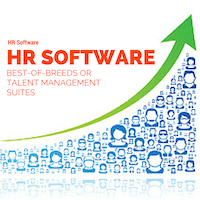HR Software: Should I Get Best-of-Breed or a Talent Suite?
 A lot of HR tools are switching from being specialized to adding broader functionalities from other adjacent HR categories resulting in many talent management suites. Vendors are moving towards providing a one-stop shop, so customers don’t have to deal with the hassle of syncing data across multiple tools.
A lot of HR tools are switching from being specialized to adding broader functionalities from other adjacent HR categories resulting in many talent management suites. Vendors are moving towards providing a one-stop shop, so customers don’t have to deal with the hassle of syncing data across multiple tools.However, picking best-of-breed vs. talent suites is much more than just comparing features and functionalities. We asked four experts: Tim Sackett, Jon Ingham, Ward Christman and Bryan Wempen about when HR should pick best of breed vs. talent suites and what the pros and cons of each system. Here is the take away from their responses:
A lot of best-of-breed HR software often get acquired and assimilated into larger suites. If you are a nimble organization, which can adapt when HR software companies get acquired and want software with in-depth features, then go with the specialized HR tool. However, there is no guarantee that the software you purchase is not going to be merged with a mature product. Also, be aware that innovative products may require continuous training. However, if you prefer stability with everything located in one place then go for suites.
Read their responses below for more insights:
Tim Sackett
Suite vs. Best in Breed is another argument that has gone on since software was invented. Depending on where an organization is in its software lifecycle they might be in the market for a suite of products, or they might be in need of a single piece of software that is leading in innovation. Once isn’t necessarily better than others. HR pros, in particular, don’t demand innovation, so suite products are very popular. HR pros want to login once, and not have to jump around from system to system. The additional importance of ease of data analysis in modern HR departments makes suites attractive as well for the simple fact that having all the data reside under one roof leads to more robust, faster, analysis.
Jon Ingham
Integrated talent management systems are great and make sense from a company and vendor perspective, so are increasingly prevalent within HR. They make analytic investigation easier and more impactful and often better echo the way that work is done (line managers and employees think in terms of their jobs and tasks that they have to perform, which are seldom limited to HR silos / sub-functions.
However, this can mean organizations face difficult choices between different integrated systems with different limitations in their functionality. The other problem which is being created at the moment is the need to guess which companies will be acquired and by whom so that companies do not end up with different modules which become parts of different parent integrated platforms. The move towards integration also has some negative impacts on the amount of innovation we are seeing within HR systems, as the aspects which made independent modules so innovative are often stripped away when the system is acquired to be part of a more traditional and corporate HR-wide offer.
Ward Christman
As the HR Tech industry continues to mature, the vendor’s product managers & executives are constantly looking at the buy vs. build vs. partner scenarios when considering market opportunities and overall growth strategies. Although some of the vendors continue to expand their offerings by building out suites, I’m seeing a huge shift towards partnering to meet customer and market needs. This path is becoming easier thanks to better standards and connectivity via APIs and data interchange hubs, with additional “alliance building” resources coming soon to support this need for collaboration. For those that insist on building or buying, they will face an uphill battle of maintaining depth of functionality as their code base grows along with the diverse needs of their clients.
Bryan Wempen
I don’t feel like a shift from specialized to suites is happening, actually just the opposite. I see specialization as the trend with a focus on features for interpretation of data and analytics about everything talent.
If you want to know more about which software product gives you the capabilities you need, take a look at the Buyer’s Guide for Core HR software. We’ll also be releasing the Buyer’s Guide for Talent Management Suite in the coming weeks. If you want to be notified, download the Core HR guide or follow us on Twitter.
Was this helpful?
